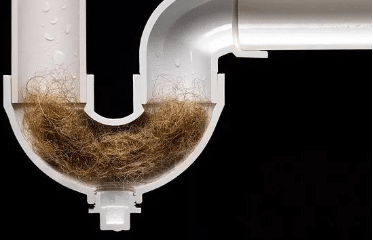How To Keep Drains Clog-Free
The number one way to prevent clogged drains is to keep them clean. Pipes and drains tend to be “out of sight, and out of mind” when we think of regular home cleaning, but keeping them clean and clear of debris is just as important to your health as making sure your kitchen counters are wiped down and the tub is scrubbed.
If you keep in mind of what you put down your drains, you really shouldn’t need to clear them of debris very often. Some drains in your home will need to be checked on more regularly, particularly bathtub or shower and bathroom sink drains because that’s usually where hair becomes a problem. Hair loss while shampooing or shaving is a natural everyday occurrence, but it doesn’t take much to block a drain pipe. When you add to that all of the soap and toothpaste you’re using, it’s easy to see why clogs can happen so quickly and be very stubborn.
How to Clean Drains
About once a week:
- Lift up pop-up stoppers in the bathroom sink, remove any debris and put it in the trash, then rinse the stopper off and put it back in the drain.
- Remove the drain cover from your shower or bathtub drain and use a bent wire or a hair catching brush to clear out any debris that has accumulated there.
About once a month:
- Clean your garbage disposal with a sturdy garbage disposal brush or grind up a few cups of ice and some table salt. This helps to cut the grease and slime off the sides of the disposer. Then flush it out with cold water followed by half of a lemon or lime to deodorize.
- If you have a bathtub, remove the overflow plate and raise the pop-up assembly to reach the spring or rocker arm. Remove any accumulated debris and rinse well before putting it back.
- Use a bacteriological drain cleaner to maintain all of the drains in your home. We strongly recommend using the Roebic K-67 granulated bacterial drain cleaner because it is 100% biodegradable, non-corrosive (so it won’t damage your home’s plumbing system), and is much safer for your family than chemical drain cleaners.
How To Keep Drains Clog-Free
Now that your drains are free of debris, let’s keep them that way! There are plenty of simple things you can do every day to help reduce the number of clog-inducing substances that go down your drains. It might seem like a lot of work at first, but these things can quickly become a habit. And unlike some habits, this one is actually saving you time, money, and a lot of headaches!
- Place mesh drain screens over all of your drains – especially bathtub or shower drains – to catch hair, food particles, and other gunk. This is probably the simplest, yet most effective thing you can do to maintain clog-free drains. Mesh drain screens can be installed below your shower drain cover so you don’t have to mess up your shower decor or leave the drain uncovered. If you have a screw-in drain cover, you can place the #30 shower size screen below the drain cover and simply screw through the mesh to replace the cover. If you have a snap-in shower drain cover, you’ll need our #40 tub & laundry size strainer, which will sit on top of the actual pipe allowing the drain cover to snap back into place.
- Brush your hair immediately before showering or taking a bath to help remove the majority of loose hair. The hair is caught in the brush and disposed of in the trash rather than down your drain. Some hair will still go down the drain, but this should help reduce that amount.
- Wash pets outside when the weather is warm enough. Once it turns cold, if they need a bath indoors, lay a wash cloth over the shower drain to catch excess hair and dispose of the hair later in the garbage. Alternatively, consider using a washtub instead of your bathtub or shower. That way you can empty it outside and avoid pouring pet hair down your drain.
- Reduce your dependence on the garbage disposal and start a compost bin. Not only does this help save water and energy, but you’re putting fewer solid, sticky substances down the drain to potentially create a clog. Even if you don’t have a garden or lawn, many community gardens and garden co-ops will be happy to pick up and use your compost.
- Teach children the importance of maintaining your home’s drain system, as well as the effects misuse of our drains can have on municipal wastewater systems and our environment. Make sure they understand toys should never be flushed, and any toy smaller than the drain shouldn’t be played within the tub.
- Get a quality plunger and/or an auger (also known as a drain snake) and learn how to use them. Sometimes clogs will just happen, no matter how much we try to avoid them. Someone flushes too much toilet paper, you accidentally drop something down the sink, etc. – life just isn’t perfect. But you can save yourself a lot of money by handling small clogs yourself rather than calling a plumber. We do not ever recommend using ANY chemical cleaners. However, if you absolutely MUST use chemical drain cleaners, do so sparingly, especially if you have metal pipes as these cleaners can cause corrosion.
Don’t Treat Your Drains Like a Garbage Can!
We cannot stress the importance of this enough. Your garbage disposal, toilet, sinks, and other drains in your home simply aren’t meant to accommodate the size and composition of many of the things we put down them on a regular basis – and our septic tanks and municipal waste systems aren’t either.
Be mindful of what goes down your drains, including:
- Grease, fats, or oils from cooking – they congeal and cause other items to get stuck, creating clogs and massive blockages. This is a really broad category that includes meat fats, lard, vegetable oils, shortening, butter, margarine, and many dairy products.
- Coffee grounds – they pretty much do the same thing grease does.
- Meat, poultry, and fish bones, as well as egg shells – garbage disposals aren’t meant to grind bones or egg shells, so the shards often go down the drain to form clumps with other items. The fat from any meat left on the bones only makes the clog worse.
- Pasta, rice, and bread will expand with water causing blockages. And even if the water eventually drains, these foods are most likely still stuck to the inside of your pipes to cause another blockage next time.
- Gum…it seems fairly obvious that something that is basically a sticky ball will get hung up somewhere.
- Stickers – often people will pull the label stickers off fruits and veggies and simply toss them down the drain during washing. These can clump up with other things to cause clogs.
- Hair. Human, pet, doll, fuzzy pillow, or stuffed animal hair – it doesn’t matter – just try to keep it out of your drains.
- Baby wipes, napkins, paper towels, and other paper products. Even some toilet papers just don’t dissolve quickly or thoroughly enough to be handled by septic or sewage lines.
- Tampons, maxi pads, other feminine hygiene products, including the packaging they come in.
- Cotton balls, cotton swabs, cigarette butts, fabric softener/dryer sheets, or similar fibrous materials – including fibrous foods like celery, carrots, and potato peels which your garbage disposal cannot chew up.
- Cat litter, even the flushable kind.
- Other “flushable” products – including toddler wipes and sanitary products. Most often these things don’t break down as well as the manufacturer claims, especially if you have a septic system.
- Band-aids and dental floss – both can tangle up and turn into the big clogs.
- Razors, blades, syringes, needles, etc. – these can cause serious injury to municipal sewage/wastewater workers and to wildlife. Contact your local pharmacy or public health authority for safe ways to dispose of this type of item.
- Condoms, balloons, or rubber gloves will inflate and can be a fairly destructive obstruction.
- Prescription medications, lotions, and cosmetics. While anything that goes in or on your body might seem safe, these items can be potentially toxic to wildlife and/or bleach into our drinking water. Many pharmacies will “take back” leftover medications, or check with your doctor or local public health authority for similar disposal programs.
- Glue. Do we really need to explain why this is a bad idea?
- Bottle caps, whether metal or plastic, will not only ruin your garbage disposal but can also get stuck in smaller pipes.
- Toys are a common culprit of toilet clogs. Teach kids about what is and isn’t okay to flush, and make sure they understand the toilet isn’t a jacuzzi for Barbie and G.I. Joe.
- Soap can clog drains faster than you might think – mostly when the residue builds up and catches other things. Try using less detergent, shampoo, toothpaste, etc. when you can, and from personal experience, we recommend trying to keep the kids from dropping a bar of it down the toilet…
- Paint, paint solvents, nail polish, or nail polish remover harm our groundwater and in many places are illegal to put down drains. Check with your local paint or hardware store for information about how to dispose of these items properly.
- Motor oil, transmission fluid, anti-freeze, etc. Your local auto parts store can tell you how and where to dispose of these substances, and some even have programs to dispose of them for you.
- Bleach and other anti-bacterial cleaners. This one is mostly for those who have a septic system since anti-bacterial agents can kill off the good bacteria that are keeping your septic system functioning, although there is mounting evidence that these cleaners are detrimental to municipal sewage systems as well.
Need a Plumber in Bastrop County? Call Parobek Plumbing now at (512) 910-8123!




